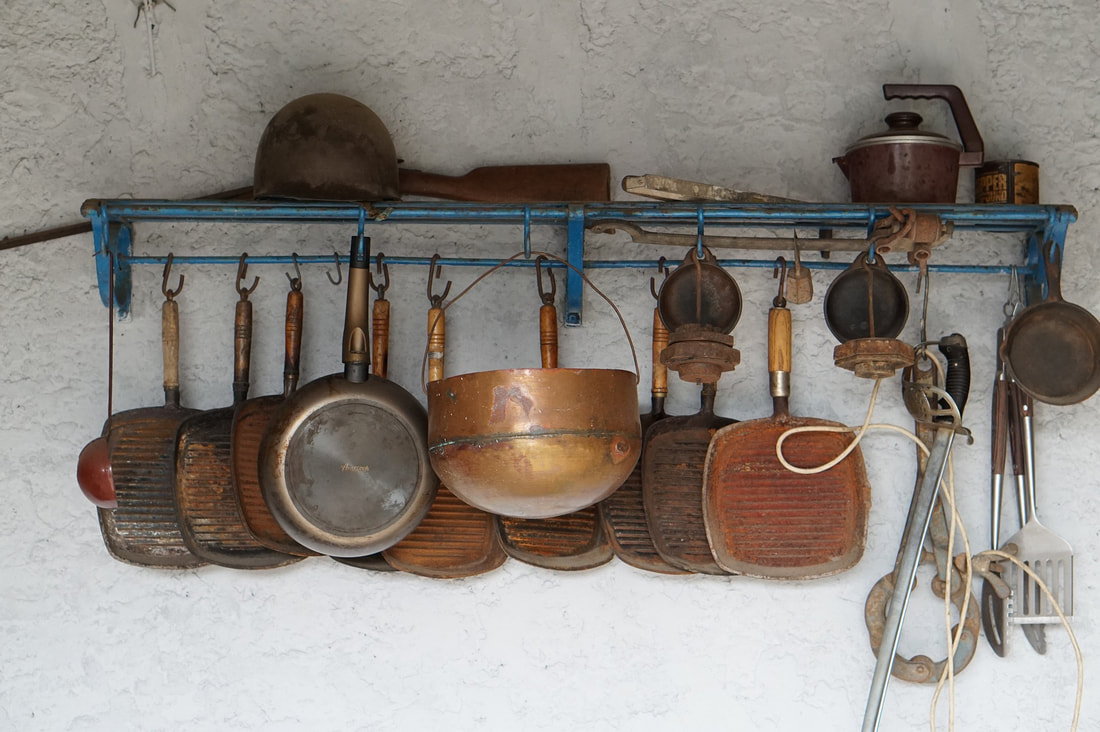|
If you are anything like me and your life revolves around the kitchen then you are in the right place. I have always dreamt of living in a house where the kitchen is the largest room, and everything revolves around the kitchen, the hearth, and around family meals. Welcome to Kitchen Essentials! Here, I will be sharing with you my best kitchen tips, tricks and hacks - all things food. POTS AND PANS - OR SHALL I SAY "COOKWARE" I have recently seen many brands trying to sell their 12-15 piece cookware sets. Are they worth it, and do you really have the space for it... probably not! I won't lie, I am quite greedy when it comes to owning different kinds of pots and pans, and have probably brought a piece of cookware back from every country that I have been to. But do I use them all? Not really ;) There are probably only about 6-7 pans in my kitchen that I use regularly, 1. Medium-sized, light frying pan - for frying eggs, and dry-roasting spices 2. Flat-griddle - for making pancakes and flatbreads 3. My cast-iron wok - for making Chinese food 4. Large heavy base wok - for making curries and thick sauces 5. Small kadhai (Indian deep-frying pan) - saves oil because of its circular bottom 6. Pressure cooker - for cooking stews, beans, and red meat (see more information about how to use a pressure cooker in my ALL ABOUT LENTILS blog post) 7. A large sauce pan - for cooking pasta and making stews Sri-Lankan hoppers in the making...HOW DO I CLEAN AND MAINTAIN MY COOKWARE WITHOUT DAMAGING IT? 1. Cast iron pans and woks: Good cast iron pans and woks will last you a lifetime and more. The best way to keep your cast iron pan clean is by scrubbing it with coarse salt and a paper towel. Use a little soap (if necessary) on a soft sponge and rinse with hot water. Once clean, dry immediately and heat again on medium flame to make sure it's completely dry. Finally, using a paper towel rub about 1/2 teaspoon vegetable oil all over the interior of the pan, to prevent oxidation. As and when I want to use my cast-iron pan for making pancakes or my traditional hopper pan to make Srilankan crepes, I like to ensure that they don't stick to the pan. Here is a handy tip to make your metal pans non-stick (video above) - simply halve an onion and stick a fork through the peel. Then, rub the onion flesh-side down all over the interior of the hot pan. Repeat the same process before making each pancake or crepe, if necessary. Onions contain sulfur compounds which when heated react with bare metal to form a hard, non-stick sulfide layer, thereby preventing food from sticking. This simple trick works on griddles, cast-iron pans, and grill grates. 2. Non-stick pans and griddles: Avoid using abrasive liquids when cleaning non-stick pans. I have had my non-stick pans for years - I wipe them clean with a damp cloth while still hot to remove excess oil (as the oil tends to solidify on the surface once they cool down). Once cool, I simply rinse them with hot water, and dry them before putting them away. And I only ever use wooden spoons and spatulas on all my non-stick cookware. KNIVES I am the biggest fan of expensive knife sets and totally recommend getting one if you are a keen cook. A good knife set will last you a life time. A typical set comes with 4 essential knives, 1. A chef's knife - used for chopping on a board (I have 2 as I use it a lot) 2. A fillet knife - long flexible knife used for filleting fish (I use it more for cutting Sushi rolls) 3. A pairing knife - for peeling and coring 4. A serrated knife - for slicing bread 5. Honing steel - rod-shaped steel tool used for keeping your knives sharp If you do already have the above set of knives, do remember to invest in a good knife sharpener (or have them sharpened outside). Honing steel basically pushes the edge of the knife back to the center and straightens it, whereas sharpening your knife grinds the bits of the blade and shaves it producing a new, sharp edge. Remember - a blunt knife is way more dangerous and can easily cause accidents as the chances of it slipping on your onion and on to your finger are way higher. Always, always make sure your knives are properly sharpened. HOW OFTEN SHOULD I HONE OR SHARPEN MY KNIVES?
Wish to learn more about Wok Cooking or simply want to hone your knife skills, join us for one of our fully hands-on cooking classes in Singapore. Or simply book a private cooking class.
1 Comment
|
AuthorPayal Thakurani is a cooking instructor, consulting chef, and author of the popular Southeast Asian cookbook “Curries for the Soul”. Originally based in Shanghai China, chef Payal has been in the food industry since 2012, working in training and brand development in central kitchens. She was also the proud owner of a cooking school and several food brands in Shanghai. She now lives in Singapore and heads Commune Kitchen in Downtown Gallery, where she hosts affordable, hands-on cooking classes for all ages. ArchivesCategories |
ServicesAs Listed On:
|
OUR KITCHENCommune Kitchen Pte. Ltd
182 Cecil Street #02-10/11 Frasers Tower 069547 |
|
© COPYRIGHT 2024. ALL RIGHTS RESERVED.



 RSS Feed
RSS Feed
